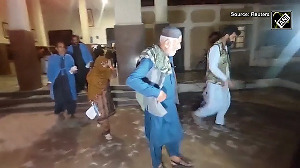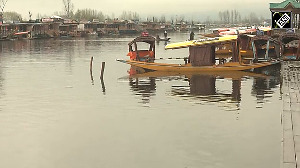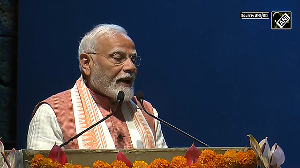Ambassador Howard Schaffer, a 36-year-old veteran of the US Foreign Service and author of the acclaimed book titled The Limits of Influence: America's Role in Kashmir, has said that President Barack Obama was the first presidential candidate in US history to mention Kashmir in a presidential campaign.
Schaffer, who was the lead panelist on the session on India-Pakistan Relations: Breaking the Deadlock over Kashmir, at the 10th International Kashmir Peace Conference on Capitol Hill, said, "I call your attention to what Barack Obama said -- he was then a candidate and mentioned Kashmir, and as far as I know, one of the only times, if not the only time that Kashmir has come up in a US presidential campaign."
"And, what he said was that he recognised that working with Pakistan and India, to try to resolve the Kashmir crisis in a serious way, would be among the critical tasks of his Administration, if he were elected."
Schaffer, who served in India, Pakistan, and Bangladesh and twice as Deputy Assistant Secretary of State responsible for South Asian Affairs, argued: "It seems to me that there are a number of arguments to be raised as to why the United States should now look for opportunities to play a more active role in Kashmir."
However, he acknowledged, "I don't think those opportunities are present now. I think that relations between India and Pakistan in the wake of the past incident last November (Mumbai terror attacks) are still too fragile to expect any bold movement towards a resolution of the Kashmir issue with or without US help."
Schaffer said the most Washington "can hope for in the next few months is a resumption of their dialogue and of the back-channel talks on Kashmir that have been going on for about five years until they were suspended at the time of the Mumbai events."
He also said that "the fact that there is a relatively weak government in Pakistan, make it very difficult for the Pakistanis to accept the concessions, which will be necessary if any final settlement is to be reached. India faced that same problem earlier this year, but with the successful re-election of Dr Manmohan Singh in a stronger political position than he enjoyed before, the Indians may be in a better position. But there are still these very important obstacles."
But Schaffer reiterated that there is a strong rationale for the United States, even after all these unsuccessful efforts -- which he outlined in his book -- to play a positive role in bringing the Kashmir issue to a settlement and why Washington should be involved, even though some may argue that this is "crazy."
He said, "There are a number of developments, which makes it more important for us to look carefully at possibilities for a more active role. One of these is that the United States' interests in South Asia are now probably greater than at any other time."
"Pakistan's critical role in shaping the future of Afghanistan and otherwise contributing to the battle against terrorism, has given our relations in South Asia a further major dimension," he said.
According to Schaffer, "The traditional focus of the Pakistan armed forces on combating a perceived threat from India and the continued patronage that Pakistan's intelligence agencies provide to Islamic extremists in Kashmir, make it more difficult both politically and militarily for Islamabad to help the US and its coalition partners combat these extremist forces in Afghanistan."
He said, "These factors heighten Pakistan's own problems in contending with extremists in FATA (Federally Administered Tribal Areas) or along the Afghan border as well as in settled areas further east. Pakistan's support for armed Islamic insurgents in Kashmir contribute significantly to tension with India and heightens Indian suspicions that Islamabad is responsible for perpetrating violence within India proper."
Schaffer added, "And, finally, until a settlement is reached, there will be no dearth of spoilers, eager for opportunities to inflame Indo-Pakistan relations. And, that's one facto that's become important to Washington -- this region."
The South Asia expert also said that another important point is that "there has been an improvement, particularly over the last decade in US-India relations, and have made the Indians somewhat less suspicious about a role for the United States than they have been."
"Another point, alluded by Mr Obama is India's wish to play a global role -- a role which is now realistically within India's grasp. This may make India more interested in ridding itself of what you may call the albatross of Kashmir and the widespread belief that India's foreign policy focuses a great deal -- indeed too much -- on relations with Pakistan."
Schaffer said another reason why the US "might look to play a more than cheerleading role than it has in recent years is that the positions that Indians and Pakistanis have taken in their composite dialogue and more importantly, in the backstage talks between negotiators for each side, these positions have become closer the position taken by President Musharraf in 2006 when he went much further in trying to be more forthcoming than had ever been the case in the handling of issues by previous Pakistani governments."
He said if the US decides to get involved, Washington "should support that the Line of Control or a line geographically close to it, should become the international border or at least that it become a permanent border until one side or the other wants to change that peacefully."
Schaffer said the US should also push for "maximum autonomy for both parts of Kashmir -- the demand for autonomy is greater on the Indian side than on the Pakistani side, but I would argue that such a settlement would be easier to sell in India if both sides are given the same substantial degree of self-government."
"A third point is that there should be easier passage for people and goods between the two sides of Kashmir, and a concept that there be created institutions on an all Kashmir basis, which would deal with non-conventional issues such as power generation, tourism and other such issues."
Schaffer said that this could be a package that the US could push for "that could make up a settlement," and while acknowledging that "it will not make everybody happy," argued that it is imperative to look at the Kashmir issue "realistically on the basis of what we know looking back 60 years that this is the most reasonable way it can be brought about."






 © 2025
© 2025